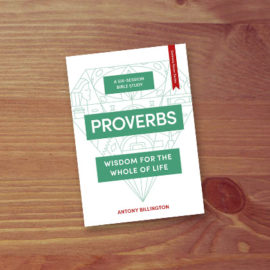Connecting with Culture
Our blog reflecting on weekly news, trends, innovation, and the arts...
Read

It began quite innocently. A little while back, the US election was called after a tense few days, and thousands of millennials on this side of the pond celebrated the result. Why, I wondered? Long story short, a friend offered an insightful Christian perspective. I thought it worth sharing, and so with limited further thought, onto my Facebook it went.
The basic point was: ‘character matters!’ Even conservatives like John Piper agreed, so I wasn’t exactly dangling click-bait. Nevertheless, over 200 comments later, the polarisation was painfully apparent. Perhaps I was naive, expecting to spark a civil dialogue – but must disagreement be this hostile?
Where, then, can wisdom be found as I navigate the web?
Whatever your take on the US election, my posting was strategic. At LICC, we’re all about helping Christians grow in fruitfulness on their frontlines, making a difference where we live, work, and play. But what about where we ‘surf’? How is Christ’s Lordship over all revealed in the virtual world as we engage on social media?
Not surprisingly, in lockdown, our screen time has surged to over six hours every day. Reports vary, but at a minimum 70% of UK adults (93% of Gen Z) have multiple social media accounts, spending over 39 minutes each day scrolling and posting, transfixed like moths by the blue backlight until we flutter anxiously off to sleep. (WeAreSocial’s ‘Digital in the UK’ report estimates the average follower spends 110 minutes per day across seven accounts, mostly on their mobile.) While Facebook usage has dipped with the rise of Instagram, it’s still the biggest platform, meaning this is a digital frontline we cannot ignore.
How, then, do we leverage our virtual interactions as whole-life disciples?
WWJP: What Would Jesus Post?
When I first posted on the US election, I was expecting tasty fruit – right in the 6Ms sweet spot. My tone was gentle and didn’t cast judgment, and I was attempting to call for mutual understanding and the modelling of godly character by leaders at every level. The piece itself was well written, exhibiting the making of good work. As disagreement arose, I tried to minister grace and love.
This was a small way of moulding culture on my bit of virtual earth, trying to call left and right together around something we could agree on – the need for virtuous character in our leaders . Perhaps self-righteously, I saw the broadcasting of this view as a chance to be a mouthpiece for truth and justice, rather than polemical rhetoric. And while the focus was political, I tried to point us back to our common brokenness and character failures before the cross, as a messenger of the gospel.
So far, so good, right? And yet, I hadn’t realised just how contrarian our online culture has become. Social media has hived us off into echo chambers, where we’re less likely than ever to encounter views with which we vehemently disagree. We’ve filtered them out, shielding ourselves from difference. And yet, the level of ‘hateful content’ is on the rise. Why pull punches as my virtual persona?
I thought mediating between two such echo chambers would be a fruitful use of social media. As the comment section ballooned, however, it was increasingly apparent that few were interested in empathising with their ‘enemy’. Angry words and conversation stoppers multiplied. Heat overwhelmed light. As an agnostic friend privately messaged, ‘Bad luck posting a moderate opinion, old boy!’
The point of sharing all this is not to convince you of my digital virtue or condemn the passion of others. Instead, it’s to show that online fruitfulness requires discernment. It’s trickier than we might think at first glance, clicking ‘post’ like a reflex action before a watching world.
This adds another complexity, requiring discernment. With Paul, I’m all for becoming ‘all things to all people so that by all possible means I might save some’ (1 Corinthians 9:22). Just not all at the same time!
On my physical frontlines, I have control over what I say and to whom. On social media, everyone gets a window into my life and musings simultaneously. It’s out of my control how the article I posted was perceived by my non-Christian parents-in-law in rural Queensland, my work colleagues in London, my running mate in rural Buckinghamshire, and my agnostic lesbian neighbours in the downstairs flat. Maybe that’s a good thing – maybe it could encourage me to present a single, authentic identity online, being transparent with who I am as a follower of Christ. Maybe not.
Either way, I’m back to where I started. To post or not to post? Lady Wisdom may cry out in the public places, but what, if anything, should I call out on social media? Where is wisdom for the web?
Situating scripture
At this time, as a committed evangelical, I crack open the Bible. To Proverbs, of course. What timeless truth may speak to my confusion, telling me, ‘here is the path, walk in it’?
‘Do not answer a fool according to his folly, or you yourself will be just like him. Answer a fool according to his folly, or he will be wise in his own eyes.’
PROVERBS 26:4–5, NIV
Um, yep, so which is it? To answer or not answer a fool, that is now the question! This looks like blatant contradiction, as incoherent as my social media thread. The writer was surely aware he was putting opposite actions side-by-side. So what’s going on? And how might this apply to social media?
I love that God’s sacred word includes contraries and multiple takes on the world. Because that is the way of wisdom. It’s not about rules dropped from above and flatly applied. Rather it needs an illuminated community in conversation to work it out. Wisdom is deeply situational, and situations change – which means so must we. A fruitful post one day may be rotten the next. Part of the glory for God’s image bearers is discerning what’s most faithful in a given moment.
Wisdom is paying close attention to the unique contours of our context, and then humbly yet courageously stepping out to act toward what we pray will produce the best fruit. It’s about minimising the fallout of sin where people and systems have turned in on themselves for selfish gain. And it’s about serving the common good, fostering holistic flourishing as we lovingly relate to God, neighbour, nature, and ourselves. It’s a succession of tiny steps in the right direction to see the world become the kind of place where we all want to live together in peace.
A wiser post?
What does that mean practically for social media – and for me? Well, I gather virtually throughout the week with a community of Christians seeking to be wise – albeit stumbling onward as limited, biased pilgrims are prone to do. After my Facebook post blew up, I shared my story, and together we thought about what happened and why.
We spent solid time wrestling with God’s word, and discerning what’s best in future social media situations through silence – leaning on the Spirit’s still small voice. We prayed together for love to motivate and characterise all we do, even how we post. And now we try to live it out as best we can. Shunning regret, we confess our failures and celebrate our wins, releasing the results to God. Then we commit to start all over again tomorrow, a little bit wiser for what (not) to post than we are today.
For me, that means doing less virtue signalling and sermonising, and asking more insightful questions to draw out deep beliefs with the potential to tell a better story of reconciliation in Christ. The dust has now settled and the thread is thankfully quiet. Following a debrief with half a dozen godly friends, I took some of the more damaging posts into private messenger conversations, asking God to guide my words and work through me to bring grace and mercy. Most went well, bringing relational fruit even when we disagreed.
When it comes to fruitfulness on social media, the bottom line is this: forget the formula, and instead seek to emulate Jesus, who embodied wisdom, day by day. One day we might be silent to avoid inciting unnecessary conflict, and the next we might speak truth to power to expose folly and warn others. Over time, through the Spirit’s empowerment, we build the virtue to instinctively act in ways that are wise, surfing social media with godly substance and style. That’s part of why I start every day hanging on every word my Creator says, longing to share it with others as we journey together.
Whatever you do, wherever you are, whoever you are, and however you post, may you ‘get wisdom, get understanding … and she will protect you; love her, and she will watch over you’ (Proverbs 4:5–6, NIV).
God bless as you seek to be fruitful, even on Facebook.
Dave Benson
Director of the Centre for Culture & Discipleship
LICC
—
If this issue captures your heart, too, then these next steps may be timely for you!



Author
Dave Benson